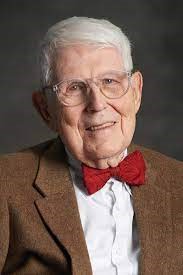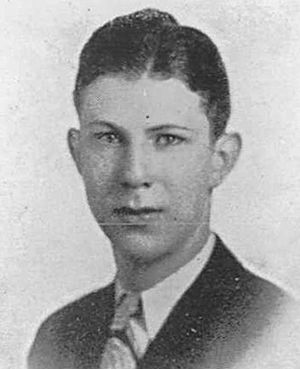Aaron T. Beck facts for kids
Quick facts for kids
Aaron Beck
|
|
|---|---|
 |
|
| Born |
Aaron Temkin Beck
July 18, 1921 Providence, Rhode Island, U.S.
|
| Died | November 1, 2021 (aged 100) |
| Alma mater |
|
| Known for | Beck Depression Inventory |
| Spouse(s) |
Phyllis W. Beck
(m. 1950) |
| Children | 4, including Judith |
| Awards | See list |
| Scientific career | |
| Fields | Psychiatry |
| Institutions | University of Pennsylvania Beck Institute for Cognitive Behavior Therapy |
Aaron Temkin Beck (born July 18, 1921 – died November 1, 2021) was an American psychiatrist. He was a professor at the University of Pennsylvania. Dr. Beck is known as the founder of cognitive therapy. This type of therapy helps people understand how their thoughts affect their feelings and actions. His ideas are widely used to help people with depression.
Contents
Early Life and Education
Aaron Temkin Beck was born in Providence, Rhode Island, on July 18, 1921. He was the youngest of four children. His parents, Elizabeth Temkin and Harry Beck, were Jewish immigrants from Ukraine. The family lived a comfortable life in Providence.
Aaron went to John Howland Grammar School and Nathan Bishop Junior High. He graduated from Hope Street High School in 1938. He was the best student in his class. As a teenager, Aaron wanted to be a journalist.
He then went to Brown University and graduated in 1942. At Brown, he was a top student and wrote for the school newspaper. After Brown, he studied at Yale Medical School. He planned to become a doctor who specialized in internal medicine. He earned his medical degree in 1946.
After medical school, Dr. Beck trained in pathology and neurology. Neurology is the study of the brain and nervous system. He liked how precise neurology was. But because there was a need for doctors in psychiatry, he spent six months learning about it. Psychiatry is the study and treatment of mental illness. He became very interested in it.
From 1946 to 1950, Dr. Beck finished his medical training. Then, he worked at the Austen Riggs Center. This was a mental hospital in Massachusetts. He stayed there until 1952.
After this, he served in the United States Military. He worked as an assistant chief of neuropsychiatry at Valley Forge Army Hospital.
Developing Cognitive Therapy
In 1954, Dr. Beck joined the Department of Psychiatry at the University of Pennsylvania. Here, he created new ways to measure depression and anxiety. These tools included the Beck Depression Inventory (BDI) and the Beck Anxiety Inventory (BAI). The BDI is one of the most used tools to measure how severe depression is.
Dr. Beck's research led him to create cognitive therapy. This therapy helps people change negative thinking patterns. It teaches them that their thoughts, not just outside events, affect how they feel. For example, if you think "I'm terrible at everything," you might feel sad. Cognitive therapy helps you challenge that thought and think more realistically.
He also worked with psychologist Maria Kovacs. Together, they created the Children's Depression Inventory. This tool helps understand depression in children. Dr. Beck's work at the University of Pennsylvania also inspired other researchers, like Martin Seligman.
Dr. Beck was the President Emeritus of the Beck Institute for Cognitive Behavior Therapy. This is a non-profit organization. He was also the Honorary President of the Academy of Cognitive Therapy. This group certifies qualified cognitive therapists.
Personal Life
Aaron Beck married Phyllis W. Beck in 1950. They had four children: Roy, Judy, Dan, and Alice. His daughter, Judith S. Beck, also became a well-known expert in cognitive therapy.
Selected Awards and Honors
- The 7th Annual Heinz Award in the Human Condition
- The 1992 James McKeen Cattell Fellow Award
- The 1999 Joseph Zubin Award
- The 2004 University of Louisville Grawemeyer Award for Psychology
- The 2006 Lasker-DeBakey Clinical Medical Research Award
- The 2010 Bell of Hope Award
- The 2010 Sigmund Freud Award
- The 2010 Scholarship and Research Award
- The 2011 Edward J. Sachar Award
- The 2011 Prince Mahidol Award in Medicine
- The 2013 Kennedy Community Mental Health Award
Dr. Beck received special degrees from many universities. These included Yale University, University of Pennsylvania, and Brown University.
In 2017, Medscape named Dr. Beck the fourth most important physician of the last century.
See also
 In Spanish: Aaron T. Beck para niños
In Spanish: Aaron T. Beck para niños


